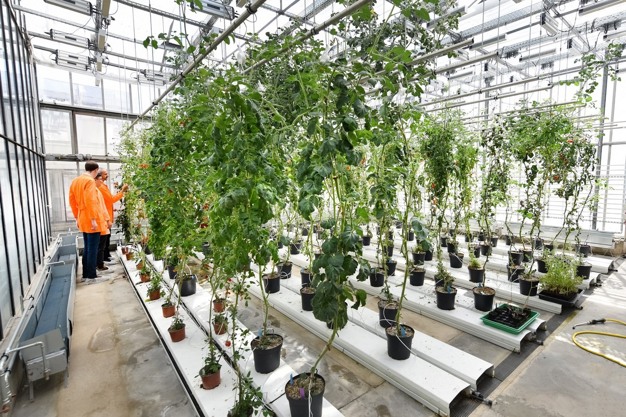 Over the last five years, Charles Underwood, Group Leader at the Max Planck Institute for Plant Breeding Research (Cologne, Germany) and Professor at the Radboud University (Nijmegen, the Netherlands), and his team have focused on the complexities of plant reproduction. They use tomato as a model system to study seed development and develop clonal reproduction technologies.
Over the last five years, Charles Underwood, Group Leader at the Max Planck Institute for Plant Breeding Research (Cologne, Germany) and Professor at the Radboud University (Nijmegen, the Netherlands), and his team have focused on the complexities of plant reproduction. They use tomato as a model system to study seed development and develop clonal reproduction technologies.
"The reproduction of plants is a fascinating field," Charles explains. "We study how plants make pollen and seeds, using tomato as a genetic model. While tomato is an important crop, it also provides an excellent system to explore reproduction at a genetic level."
Photo right: using tomato as a model system. Photo credit: Frank Vinken
Recently, his team achieved the creation of clonal sex cells in tomato. This innovation enables plants to accurately pass on all genetic information from both parents, moving away from the normal situation, where offspring inherit only half the genetic material from each parent.
The science behind clonal reproduction
The research makes use of genome editing as a tool. "We developed a system where both the egg and sperm are clonal, carrying 100% of the parent's genetic information," Charles states. "This was achieved by editing three specific genes involved in meiosis, the cell division process responsible for forming sex cells."
A clonal egg from one parent was fused with a clonal sperm from another parent. This allowed the offspring to carry double the genetic information of a standard tomato plant, resulting in plants with 48 chromosomes instead of the typical 24. The factors affected by this doubling of the genetic information may include important agronomic factors, including yield and robustness. "The cultivated potato – a close relative of tomato – has naturally doubled to 48 chromosomes. This is thought to contribute to the vigor and robustness of potato."
The team's work in tomato represents the first engineered system – in any plant or animal species - where a clonal egg from one parent is fertilized by a clonal sperm coming from another parent. There is a lot of potential to apply this to other crop types as well, according to Charles.
Collaboration plays a vital role in advancing this research. Charles acknowledges the contributions of colleagues, including efforts to develop similar systems in rice. "While our work in tomato is unique, it complements broader efforts in the scientific community to explore clonal reproduction across crops."
Applications in plant breeding and the industry
Hybrid tomato seeds are notoriously expensive, often costing around one euro per seed. Charles elaborates, "Hybrid seeds are currently produced through manual processes—pollinating flowers by hand and extracting seeds from those fruits. It's labor-intensive, making hybrid tomato seeds more expensive than gold by weight."
The ability to propagate hybrid plants through clonal seeds could drastically reduce these costs. "If a hybrid plant could produce seeds clonally, the production costs would plummet. This would not only make hybrid seeds more accessible but could also increase genetic diversity in seed catalogs," he adds.
Beyond cost reduction, clonal seed production could address long-standing challenges in horticulture. Charles explains, "Traditional breeding methods result in genetic segregation, leading to variability in plant performance. This is why farmers do not save seeds from hybrid plants. Clonal reproduction would maintain uniformity and preserve the superior traits of hybrid plants across generations."
This technology can also increase the diversity of commercially available hybrids. "Currently, most seed companies offer limited varieties of hybrid tomatoes due to the high cost of developing and producing them. With clonal propagation, it becomes feasible to expand these offerings significantly," Charles suggests.
 © Frank VinkenCharles Underwood, Yazhong Wang, and Raphael Mercier. Photo credit: Frank Vinken
© Frank VinkenCharles Underwood, Yazhong Wang, and Raphael Mercier. Photo credit: Frank Vinken
Building on natural engineered systems
"In nature, some plants like dandelions reproduce clonally, maintaining genetic and phenotypic stability across generations," Charles says. "There's also evidence from engineered systems in crops like rice, showing that clonal reproduction can enhance uniformity and agronomic performance."
"Our next steps include refining the technology to produce fully clonal seeds in tomato," says Charles. "Currently, we've succeeded in creating clonal eggs, while converting these into seeds that can self-propagate is an ongoing focus."
Science and horticulture
"We aim to make this research understandable, bridging the gap between advanced science and its implications for growers and the horticultural industry," he says.
As clonal seed production moves closer to practical application, its impact can be massive. From cost savings to enhanced diversity and uniformity, the benefits are still to be fully understood. "Ultimately, our goal is to make hybrid seeds readily available for farmers in all nations, and facilitate sustainable, high-performance, agriculture around the world.," Charles concludes.
Charles's research is supported by the Max Planck Society for the Advancement of Science (a non-governmental and non-profit association), the European Research Council (an agency established by the European Union to fund excellent frontier research), and the Radboud University (a public research university).
More information on this topic can be found here:
Wang, Y., Fuentes, R.R., van Rengs,W.M.J., Effgen, S., Zaidan, M.W.A.M., Franzen, R., Susanto, T., Fernandes, J.B., Mercier, R. and Underwood, C.J.: "Harnessing clonal gametes in hybrid crops to engineer polyploid genomes." Nature Genetics 56, 1075–1079, (2024). https://www.nature.com/articles/s41588-024-01750-6
Underwood, C.J. and Mercier, R.: "Engineering Apomixis: Clonal Seeds Approaching the Fields." Annual Review of Plant Biology 73 (1), 201–225, (2022). https://doi.org/10.1146/annurev-arplant-102720-013958
For more information:
Max Planck Institute for Plant Breeding Research
Charles Underwood
cunderwood@mpipz.mpg.de
www.mpipz.mpg.de
